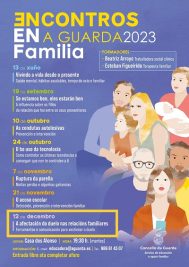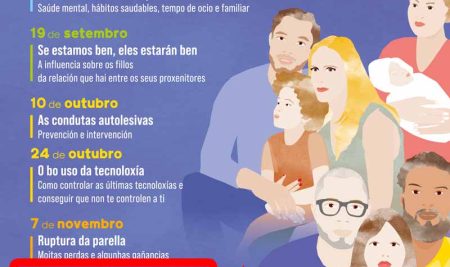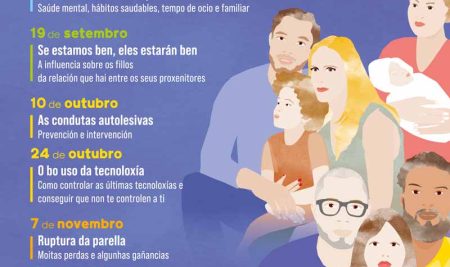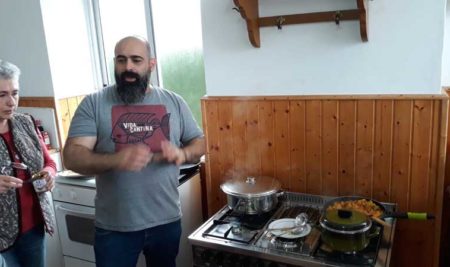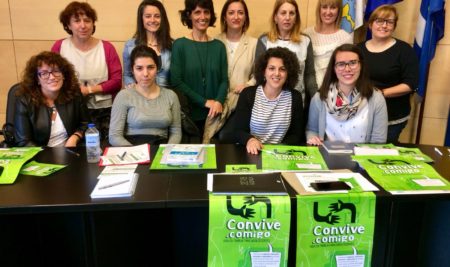- Praza do Reló 1, A Guarda, Postalcode36780 (groun floor)
- Phone: 986 610 000 (ext. 210)
- Email: educadora@aguarda.es
- Fax: 986 610 283
- Winter Schedule:
- Monday, Wednesday and Friday – from 08:00 a.m. to 3:00 p.m.
- Tuesdays and Thursdays – from 09:30 a.m. to 1:30 p.m. And from 4:00 p.m. to 7:00 p.m.
- Summer timetable:
- Monday to Friday – 08:00 a.m. to 3:00 p.m.
The Family Education Program (PEF) is a municipal educational and psychosocial support service aimed at families to promote the fulfillment of their needs, their well-being and full participation in the community. This program aims to detect and anticipate situations of social disadvantage, promoting change processes and providing families with the necessary skills for the proper exercise of family functions, facilitating processes of autonomy, responsibility and social participation.
In this program works a family educator specialized in work with families who is part of the social services team of the city.
Family Education Program
The Family Education Program (PEF) is a municipal educational and psychosocial support service aimed at families to promote the fulfillment of their needs, their well-being and full participation in the community. This program aims to detect and anticipate situations of social disadvantage, promoting change processes and providing families with the necessary skills for the proper exercise of family functions, facilitating processes of autonomy, responsibility and social participation.
In this program works a family educator specialized in work with families who is part of the social services team of the city.
- To all families.
- To educational centers, health center, other community services …
- We guide and support families: addressing issues of interest: limits and norms to children, self-esteem and security for addressing different situations, problem-solving models, how to improve family relationships, educational resources and support for reconciliation of work and family life, etc. In short, promoting the competencies of families and enhancing the optimal development of family and social life.
- We mediate and accompany families to participate in the different community resources, coordinating actions with:
- the resources and services of the municipality (OMIX, ADL, CIM, educational centers, health centers, associations, etc.), working in coordination with the different municipal departments, motivating the participation and the commitment of the different agents in the improvement of the social problems and the welfare of the families ,
- and with other specialized resources, that intervene in some aspect of the life of families, to favor an integral response. How are the family-oriented cabinets, the technical teams of the minor, the family meeting points, etc.
- We carry out group activities with families dealing with issues such as: promotion of healthy habits, social and communicative skills, guidelines for educating children, affective-sexual education, enjoyment of free time in family, education in equality, etc.
Basically, we works with the family from the accompaniment, through a relationship of help, very close, with interviews in the office as well as with home visits or accompaniments.
Interventions with families nowadays receive comprehensive care because we have an interdisciplinary team formed by the social worker of the community social services, a family educator and a psychologist specialized in family therapy and attention to adolescents, who work in a coordinated way. Therefore, the work methodology is carried out in a coordinated way, taking advantage of the different municipal and community resources.
With each family an intervention project is drawn up that establishes an individual diagnosis of each family nucleus that is the object of the intervention, as well as the planning of actions aimed at overcoming the situation that is presented.
The projects compile actions in the areas of: functions, roles and responsibilities of families, parenting abilities and competences, education for health and affective-sexual, training for employment, school monitoring and prevention of school absenteeism, housing, etc. In accordance with the diagnosis of each family nucleus.
This family intervention has a continuous character in order to achieve the objectives proposed, and in this way provide the family with sufficient competence so that they achieve their full autonomy in the solution of problems facing the future and their social participation.
